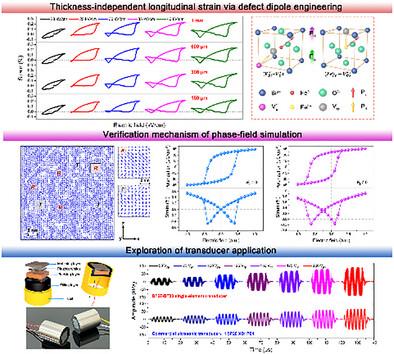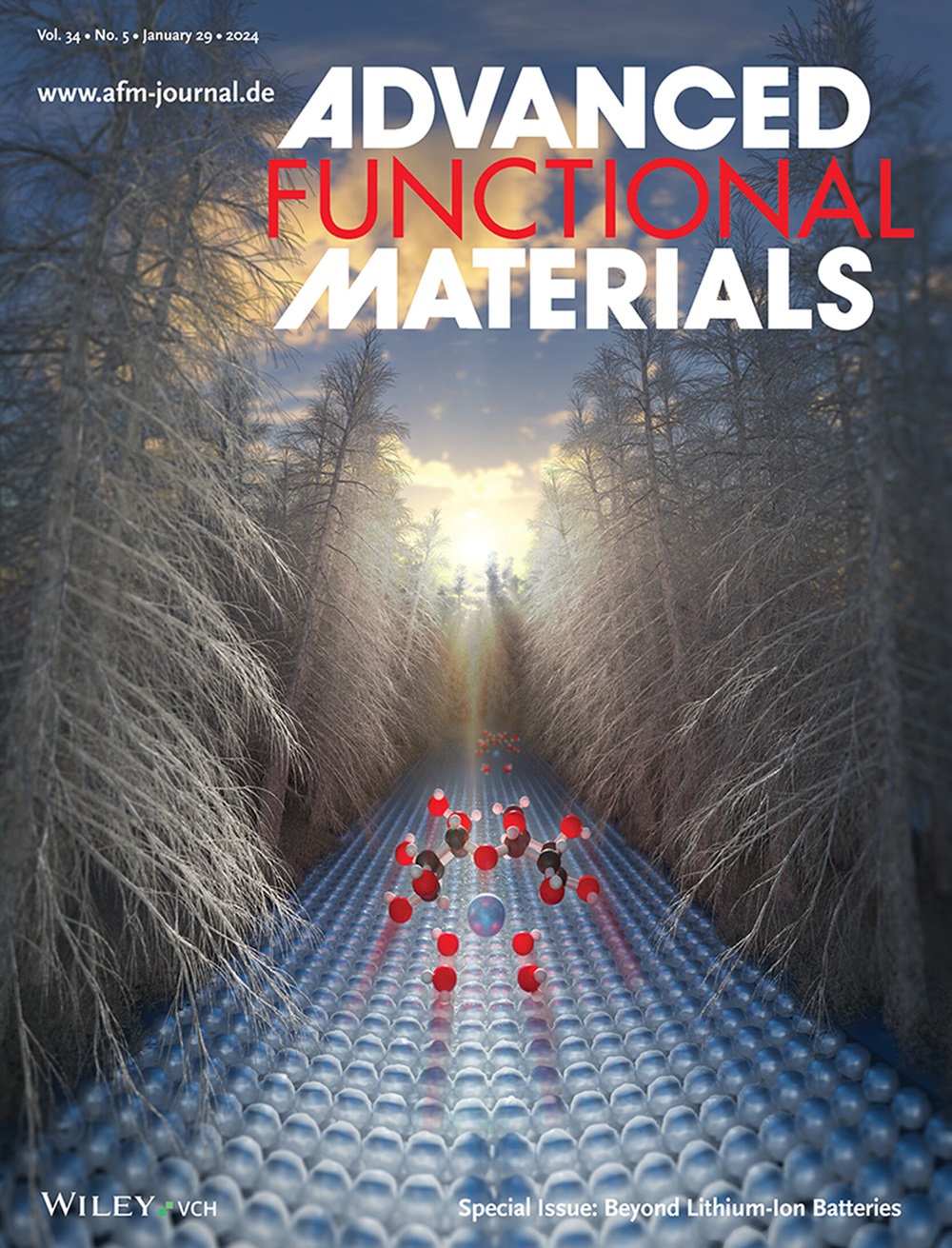利用缺陷偶极子工程研究无铅压电陶瓷中与厚度无关的特大纵向应变
IF 19
1区 材料科学
Q1 CHEMISTRY, MULTIDISCIPLINARY
引用次数: 0
摘要
大应变压电陶瓷的发展对超声换能器和执行器的发展至关重要。最近对压电陶瓷的研究表明,缺陷偶极子工程可以引起显著的应变。然而,这些应变在许多情况下以弯曲变形为主,并随着厚度的增加而迅速下降。本文报道了无铅BiFeO3-BaTiO3体系的一项突破,其中一个特定的缺陷偶极子排列过程诱导了厚度无关的大电应变,其厚度从微米到毫米不等。通过相场模拟和专门设计的测试模式,证实了主要的应变机制是缺陷偶极子调节的纵向应变,而不是弯曲引起的变形。在20 kV cm−1的低电场条件下,材料在80℃时的压电应变系数为1933 pm V−1,表现出优异的低场驱动效率。该材料制备的超声换能器性能优异,−6 dB宽带宽为58.3%,机电耦合系数为39.5%,稳定的传输灵敏度为0.93 kPa V−1,与目前商业化的铅基产品相当。这些发现不仅加深了对压电陶瓷电应变机制的理解,而且为高性能超声器件奠定了基础。本文章由计算机程序翻译,如有差异,请以英文原文为准。

Exceptionally Large Thickness-Independent Longitudinal Strain in Lead-free Piezoceramics via Defect Dipole Engineering
The development of large-strain piezoceramics is critical for the progress of ultrasonic transducers and actuators. Recent investigations on piezoceramics have shown that defect dipole engineering can induce significant strains. However, these strains are in many cases dominated by bending deformation and decline rapidly with increasing thickness. Here, a breakthrough in the lead-free BiFeO3-BaTiO3 system is reported, where a specific defect-dipole alignment process induces thickness-independent large electro-strains across thicknesses ranging from micrometers to millimeters. Through phase-field simulations and specifically designed testing modes, it is confirmed that the dominant strain mechanism is defect-dipole-regulated longitudinal strain, which is distinct from bending-induced deformation. Under a low electric field of 20 kV cm−1, the material exhibits an outstanding piezoelectric strain coefficient of 1933 pm V−1 at 80 °C, demonstrating superior low-field driving efficiency. Ultrasonic transducers fabricated from this material demonstrate remarkable performance, characterized by a wide −6 dB bandwidth of 58.3%, an excellent electromechanical coupling coefficient of 39.5%, and a stable transmitting sensitivity of 0.93 kPa V−1, comparable to the current commercialized lead-based products. These findings not only deepen the understanding of electro-strain mechanisms in piezoceramics but also lay the foundation for high-performance ultrasonic devices.
求助全文
通过发布文献求助,成功后即可免费获取论文全文。
去求助
来源期刊

Advanced Functional Materials
工程技术-材料科学:综合
CiteScore
29.50
自引率
4.20%
发文量
2086
审稿时长
2.1 months
期刊介绍:
Firmly established as a top-tier materials science journal, Advanced Functional Materials reports breakthrough research in all aspects of materials science, including nanotechnology, chemistry, physics, and biology every week.
Advanced Functional Materials is known for its rapid and fair peer review, quality content, and high impact, making it the first choice of the international materials science community.
 求助内容:
求助内容: 应助结果提醒方式:
应助结果提醒方式:


